New formats and dairy-free lines are now vying for space alongside the old faithfuls in the chiller, providing a new focus for the category
Cheddar might not be quite the big cheese it once was in the chiller as its share of the cheese market by value continues to fall, but thanks to a growing number of premium lines, new formats and dairy-free products, there are plenty of alternatives to fill any void.
Over the past year the dairy-free market has rocketed, accounting for 52% of all free-from sales in 2016 (Mintel, January 2017). Some 11% of shoppers are interested in buying dairy-free products, and this figure rises to 15% among women (IGD Shopper Vista, July 2017).
“One in five UK food and grocery shoppers claim that they or someone in their family has a specific dietary requirement that requires them to avoid gluten, dairy, or nuts,” says Nicola Ball, shopper insight manager at IGD.
“With so many shoppers now engaging with the free-from category, retailers are rapidly expanding their range of free-from products across the majority of food and drink categories.
“Not only can the free-from category help a retailer differentiate from competitors, but the right range will also drive shopper loyalty,” she adds.
Vicky Upton, head of marketing at Alpro UK and Ireland, believes alternative dairy products provide variety in the chilled aisle and allow retailers to cater for all consumer types. She says: “Suppliers of dairy milks and yogurts, and plant-based alternatives, should focus on helping retailers to add value to the dairy market as a whole.
“Today’s consumers like to experiment, and that might be with different dairy or plant-based options. They see room in their fridge for more than one milk or yogurt option.”
Alpro has seen demand for plant-based food and drinks increase by 15% in convenience and this has helped its sales grow by 21% (Nielsen MAT December 2016).
Retailers agree that Alpro products are popular and say they have seen demand for dairy products shift.
Sima Jennings, of Layer Village Stores, near Colchester, Essex, has stocked Alpro’s almond milk for a number of years. “The almond milk is something people buy because they like the taste of it,” she says, “whether it’s in their coffee or on their cornflakes. People aren’t just buying it because they have an intolerance.”
Richard Inglis, owner of three Welcome Co-op stores in the south of England, agrees. “I don’t believe that the vast majority of consumers need to drink almond or soya milk,” he says, “but it is seen as a healthy option and people are embracing it, even if they don’t actually need to buy the products.
“There is definitely so much more choice in the number of dairy-free alternatives available. We also do goat’s milk and cheese to add a bit of variety. Alternatives to cow’s milk have slowly cut their way into the dairy market.”
He points out that the Alpro milk, in particular, has been great for his sales. “It may not be the kind of seller that normal milk is, but it’s amazing how week after week you have to keep refilling the shelves as people keep on buying them.”
The Alpro milks range – almond, soya and coconut – is available in 1ltr chilled packs, rrp £1.99.
Investing in Dairy
Muller has announced plans to invest £100m in new products, made from milk produced by British farmers.
The substantial investment will be used to fund a three-year programme of development, working to manufacture and market future yoghurt and dessert products.
Muller is also planning to upgrade capacity and capabilities at its three sites in Shropshire, including doubling the size of its Telford facility by 2020.
Bergen Merey, managing director at Müller UK & Ireland Group, says: “Muller’s approach in the UK, within the yogurt and desserts and milk and ingredients sectors, is to grow our capabilities so we can reduce the UK’s dependence on imported dairy products, and build a vibrant future for the British dairy industry.”
However, Sima appreciates that not everyone is ready for a dairy revolution. “Soya milk has been less successful,” she says. “It tends to stick around on shelves. People aren’t going to take a chance on a product and then find they don’t like it. They also come in large cartons, so would be quite a lot to waste. Most people are driven by money and regular milk is still cheaper.”
Sima believes the traditional dairy and cheese market is still extremely important to independents. “Cow’s milk is still one of our best sellers and makes up about 15% of our business, maybe even 20% during peak periods.
For Richard, Babybel is proving a regular winner in the chiller. “Babybel is a really good seller for us. We do the six- and 12-packs and, as an established brand, customers are happy to buy it,” Richard says.
“Babybel has earned its place in the category and dominates the snacking cheese market. For a while, we sold other cheese snacks, but they only did well for a short time.”
Amy Fisher, shopper marketing controller at Dairy Crest, agrees that cheese snacks offer an opportunity for dairy growth, as a product that meets the healthy-eating requirements.
“Health is currently a huge priority for consumers, with nearly two-fifths of convenience store shoppers believing that having a range of nutritious options is important to them (HIM, 2016). With consumer movement towards natural, less-processed products, the backlash against sugar and growing popularity of protein-based snacks, cheese is perfectly placed to drive consumption at snacking occasions,” Fisher asserts.
“A naturally nutrient-dense product, rich in calcium and a good source of quality protein, retailers have the opportunity to champion the naturalness of cheese.”
Nigel Dowdney, owner of two stores in Norfolk, has noticed that some cheese snacks are losing their appeal among his customers.
He says: “Cheestrings are not as popular as they used to be. They tend to be on promotion quite a lot, which says a lot about a product.”
Sima also sells Cheestrings in her store, but agrees that demand has started to decline. “I think the novelty of the products has worn off,” she says. “Kids would much rather have food that comes with a toy.”
“Dairylea cheese slices seem to be selling better because they are more versatile. I think cheese is still great as a snack, but the product has to be right.”
Sima is finding that Philadelphia dips are going down well with her younger customers. “Younger people are looking for more exotic flavours and need something exciting to encourage them to have cheese,” she says.
Philadelphia is aiming to offer just this excitement with its new Flip & Dip range. It combines Philadelphia cheese with Sweet Chilli, Mexican Salsa or Caramelised Onion (rrp £1.49 per 130g, cases of six).
Susan Nash, trade communications manager at Mondelez International, believes soft cheese and snacking are key in the dairy market.
She says: “Philadelphia is the UK’s number one soft white cheese brand, and is also the largest investor in above-the-line advertising in the category (Nielsen, Total Value MAT to w/e 28 January 2017).”
The brand recently partnered with Lorraine Pascale to inspire consumers with a range of weekday dinner recipes.
The trend towards alternative dairy products shows that shoppers are prepared to spend more on products such as milk, cheese and yogurt .
Sima makes sure her cheese offer spans both luxury and traditional cheeses. “We have an older customer base and they like to have their cheese on boards,” she asserts, “or as a snack to enjoy after a meal or throughout the day.”
Get serious about cheese provenance
Mike Chatters, sales director for Lactalis McLelland, is advising retailers to tap into the key consumer drivers of quality, provenance, health and convenience to keep Cheddar sales buoyant.
“In a competitive category such as Cheddar, it is important to offer consumers a point of difference,” he asserts. “Product quality is an excellent way of creating differentiation. The fact is taste matters to consumers and quality remains an important purchase influencer.”
Lactalis McLelland is the creator of the Seriously cheese range, the UK’s third largest Cheddar brand (IRI Data 52 w/e 16 September 2017). The cheese is rich in protein, calcium and vitamin B12 and the range is also available in a Creamy Mature Lighter variety which contains less fat.
Chatters adds: “People increasingly demand to know more about the food they are eating. We are fiercely proud of the provenance of all our brands and use every available opportunity to remind consumers of their heritage.”
In October, the company unveiled a new look for its Seriously Spreadable range, including a brand and packaging makeover, designed to help broaden its appeal to families.
The Seriously Spreadable range is the UK’s number one spreadable Cheddar, growing by 17.4% (IRI Data 52 w/e 16 September 2017).
Smaller sizes
Following a recent Booker event, Sima is interested in stocking the GRH Food Company’s Signature Cheese range.
“The cheeses they sell are available in small formats, and the varieties change with the seasons. Shoppers would rather have a range of smaller, quality cheeses, which they can mix and match, and enjoy as part of a selection.”
Billy Kevan, dairy manager at Colston Bassett Dairy, agrees that more people are trading up to premium cheeses.
“While there has been heavy discounting in the commodity dairy sector, there has also been a counter trend of consumers seeking out artisan cheeses with provenance,” he says. “There has been a revival of smaller British cheese-making dairies, with about 50 new cheeses launched in 2016.”
Kevan acknowledges that free-from products have had an affect on dairy, but believes dairy has health benefits, too.
He says: “It’s a process of re-education to redress the balance – suppliers and retailers can add value by promoting the numerous health benefits of cheese. To attract the questioning customer, retailers can highlight key food trends such as the importance of minerals and gut health.”
He adds: “Colston Bassett Stilton and Shropshire Blue contain probiotics and high levels of calcium, magnesium and potassium, which aid digestion and help with bone and teeth health.”
Rich Clothier, managing director at Wyke Farms, says dairy must communicate its positive natural health benefits in a stronger way.
“We have noticed a growth in continental and blue cheese this year, which demonstrates what can happen if we meet the needs of shoppers looking for flavours and diversity in our category.”
In 2018 Wyke Farms is set to expand its #cheesefortea social media campaign. The brand is trying to encourage consumers to use cheese as a central protein source and tap into meat-free and vegetarian dietary trends.
Dairy Crest believes retailers should play to their strengths and offer customers greater convenience in the cheese market.
Dairy Crest shopper marketing controller Amy Fisher says: “Retailers have a great opportunity to target time-poor shoppers looking for convenience by offering a credible range of products for easy meal preparation, such as Cathedral City Sliced, Grated and Spreadable cheeses.
“Cathedral City’s sliced range has driven growth of 10% in value within traditional convenience, while Cathedral City Spreadable, boosted by the launch of two new flavour variants (Extra Mature and Mature Lighter) in 2016, has achieved 16% year-on-year growth.”
Richard believes the yogurt market has adapted well to demand from health-conscious consumers. “The category used to be all about Müller Corners, but now people are choosing the Greek-style or natural yogurt,” he says. “The Yeo Valley range is also really popular. There seems to be a move towards brands that contain less fat and sugar.”
However, Richard has also seen luxury dessert brands such as Gü sell really well, as customers look to treat themselves while also following a healthy diet.
Clare Denham, head of category and market strategy at Danone Dairies, recognises that consumers are looking for dairy products to suit their lifestyle.
“Natural health yogurts and desserts are the biggest segments and growth areas within the dairy market so retailers should ensure they stock both segments.”
The chilled yogurts and potted desserts market is worth £256m to the convenience channel (IRI, 52 weeks ending 7 October 2017).
She adds: “Some 96% of UK consumers buy chilled yogurts and potted desserts so retailers should ensure the fixture is easy to find, using best-selling brands as a signpost for the segment.“
Many yogurt shoppers will buy active health drink such as Actimel in addition to their usual purchase, so stock both to drive incremental sales in store.”
In the milk drinks market, Richard is looking to healthy alternatives to provide some category excitement.
“The main milk drinks such as Frijj and our own-label range sell solidly,” he says, “but I have just introduced Bam milk drinks, to appeal to people on the go and looking for a natural milk drink.”
Sweetening the deal with no added sugar
Yazoo No Added Sugar is the first milk drink of its kind to contain only naturally-occurring sugars and no artificial sweeteners.
Richard Duplock, marketing manager at Yazoo, says: “One of the biggest challenges for the category is the perceived high-sugar levels associated with dairy drinks, especially among families. Although nine out of 10 parents in the UK buy their children dairy snacks, only half currently buy milk drinks. Part of our marketing and PR challenge remains to boost awareness of the category, but also of the innovation within it.
“The No Added Sugar range will be a big focus for our business,” he adds, “and the sugar levy will no doubt encourage parents to look even more closely at not only the sugar content of the drinks their children are consuming, but the nutritional benefits. This is something milk drinks can take the lead with.”
The Yazoo No Added Sugar range is naturally rich in calcium and protein, a source of vitamin B2 and low in fat.
The range Yazoo No Added Sugar is available in strawberry, banana and chocolate (rrp 50p for 200 ml bottle, rrp £1.60 for 200ml four-pack).
Yazoo has invested significantly in media and innovation in 2017. The investment highlighted the brand’s taste credentials by supporting its 400ml assortment with a strong digital focus and YouTube campaign.
The company is now the top flavoured milk brand (IRI 52 w/e 16 September 2017).
Merchandising
Allison Wallentin, convenience category & shopper manager at Dairy Crest, believes siting dairy products with complementary items can be an effective sales strategy. “Retailers should make use of relevant product adjacencies to inspire shoppers to pick up dairy,” she says. “Cross-merchandising products that satisfy the same shop mission can be an effective way to drive up basket spend,” she advises.
“Retailers should also consider using mission-led bundle deals such as a lunchtime meal deal or meal for tonight bundle, and communicating promotions clearly at the fixture can also drive incremental sales.”
Richard employs a high-low strategy for his dairy and cheese range. “We stock the standard lines at low level so customers can see them easily and pick them up quickly. Luxury and high-end products tend to be higher up in the fixture.”
Susan Nash at Mondelez is advising retailers to stock items such as Cheddar, processed cheese and soft white cheese in the best-selling areas of their fixture, as she says these products are likely to have high penetration so should be made a focal point in the aisle.
“Avoid duplication,” she recommends. “Breadth not depth of range is key. For example, why stock eight lines of Cheddar when you can offer a range of cheese segments, such as continental, grated, sliced and snacking cheese?”
Despite the demand for dairy stagnating over recent years, there are still plenty of products for retailers to get their teeth into. By embracing NPD, convenient formats and dairy-free alternatives, retailers can continue to milk profit from dairy and cheese.
Dairy-free spreads extend their appeal
Neil Stewart, Dairy Crest’s butter & spreads marketing controller, says that while the dairy-free market has seen huge expansion over recent years in categories such as milk alternatives, this growth has yet to be fully unlocked within the butters & spreads category.
“Research indicates that 12% of the UK population claim to avoid dairy, either due to intolerance or a healthy lifestyle choice. We feel that Vitalite is perfectly positioned to lead the way in this dynamic sector.”
In February 2017, Dairy Crest also launched a new addition to its Vitalite sunflower spreads range, Vitalite Coconut. Sales of Vitalite have increased by 22% as a result of the new flavour.
Stewart adds: “Vitalite Coconut has appeal both to consumers with a dairy intolerance and to the increasing number of consumers adopting free-from products as a lifestyle choice. Highly versatile and with a hint of coconut taste, the new dairy-free spread lends itself to a wide variety of usage occasions such as cooking, baking or simply spreading on toast.”
The Vitalite range is available in 500g tubs (rrp £1.20).
As the top-performing sku in the dairy-free spread sector, Vitalite is growing at 260% volume and 332% value in the symbols and independents market, now worth £5.3m.



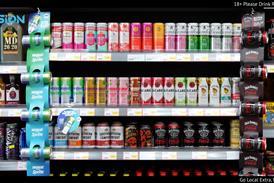


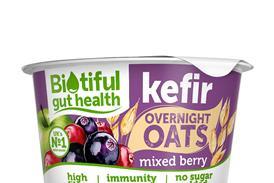









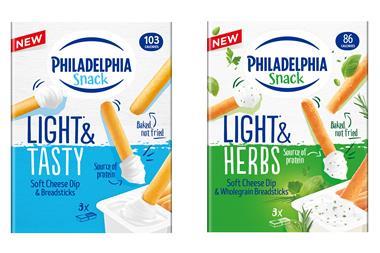
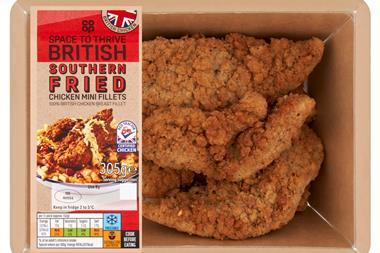
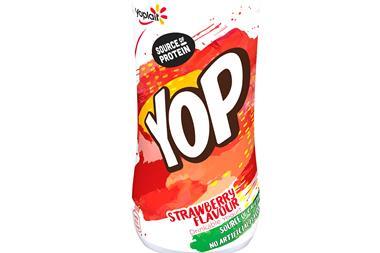
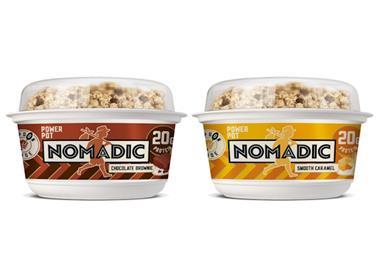
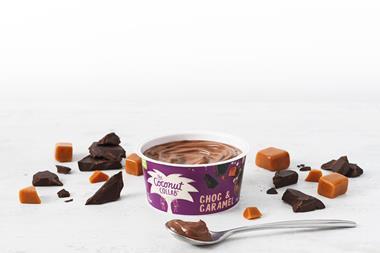
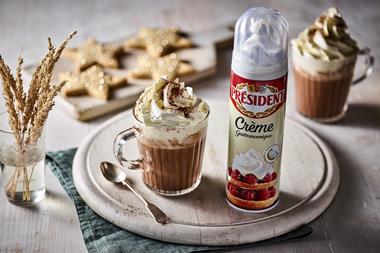





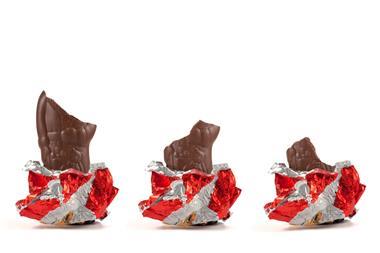
No comments yet